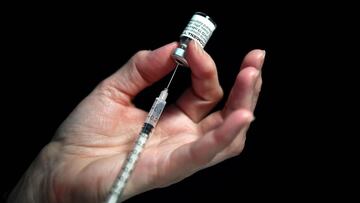When would it be necessary to have the third covid-19 vaccine?
A winter covid-19 peak is expected and pharmaceutical companies are recommending another vaccination dose to ward off the virus.


Why do I need another dose?
Pfizer announced in April that vaccine recipients would need another dose 12 months after their last, as is similar for most vaccines. Johnson & Johnson also published similar information in February. Pfizer posted the new information as part of its quarterly performance review where it claimed a third dose could "strongly" boost protection against the new wave, especially with the highly infectious Delta variant. The findings have not currently undergone a scientific review.
NEW: Pfizer data show that a third dose of its Covid-19 vaccine “strongly” boosts protection against Delta variant
— Ana Cabrera (@AnaCabrera) July 28, 2021
The presentation also says that protection against the Delta variant was five times higher in adults aged up to 55 who got a third dose of the vaccine. For older age groups, the third dose could provide 11 times more protection against the Delta variant.
“A likely scenario is that there will be likely a need for a third dose, somewhere between six and 12 months and then from there, there will be an annual revaccination, but all of that needs to be confirmed. And again, the variants will play a key role,” Pfizer CEO Albert Bourla told CNBC.
Pfizer and its partner BioNTech are currently seeking FDA approval to distribute a third dose. Israel has become the first country to authorise a third dose, also using the Pfizer vaccine.
When will it be and who will be first?
The Pfizer presentation says the groups who should be targeted first would be:
- immunocompromised, older adults,
- ages 60+ including 75 million US adults,
- ages 65+ including 54 million US adults.
More vaccine news:
- What is the vaccine mandate for NYC and California employees? When is the deadline?
- Why is the CDC recommending that vaccinated people wear masks indoors?
- Why does the Delta variant spread so fast?
- Are the majority of covid-19 hospitalizations in the US from non-vaccinated people?
- Can vaccinated people spread the Delta variant?
If the FDA approves the Pfizer request then the third doses would likely be distributed in the Autumn but there is no timeframe yet. If there is a rise in what's called 'breakthrough cases' then that could show evidence that vaccine efficacy is falling and a booster jab could be useful for suppressing the virus.
Talk of a booster could be premature as not yet 50% of the US has been fully vaccinated.
Why are covid-19 rates rising again?
Related stories
Rising rates have mainly been attributed to the developing Delta variant which is taking hold in the US. Currently it accounts for 83% of all covid-19 cases and is due to be the only varaint in circulation soon. It is twice as contagious as the Alpha variant, first sequenced in the UK, which used to be the dominant strain until recently.
People who are vaccinated can still catch the Delta variant but the chances of developing serious illness are very low. Of those who have been hopitalized with the virus, 97% are unvaccinated. The CDC has taken to calling the new wave the "pandemic of the unvaccinated."

